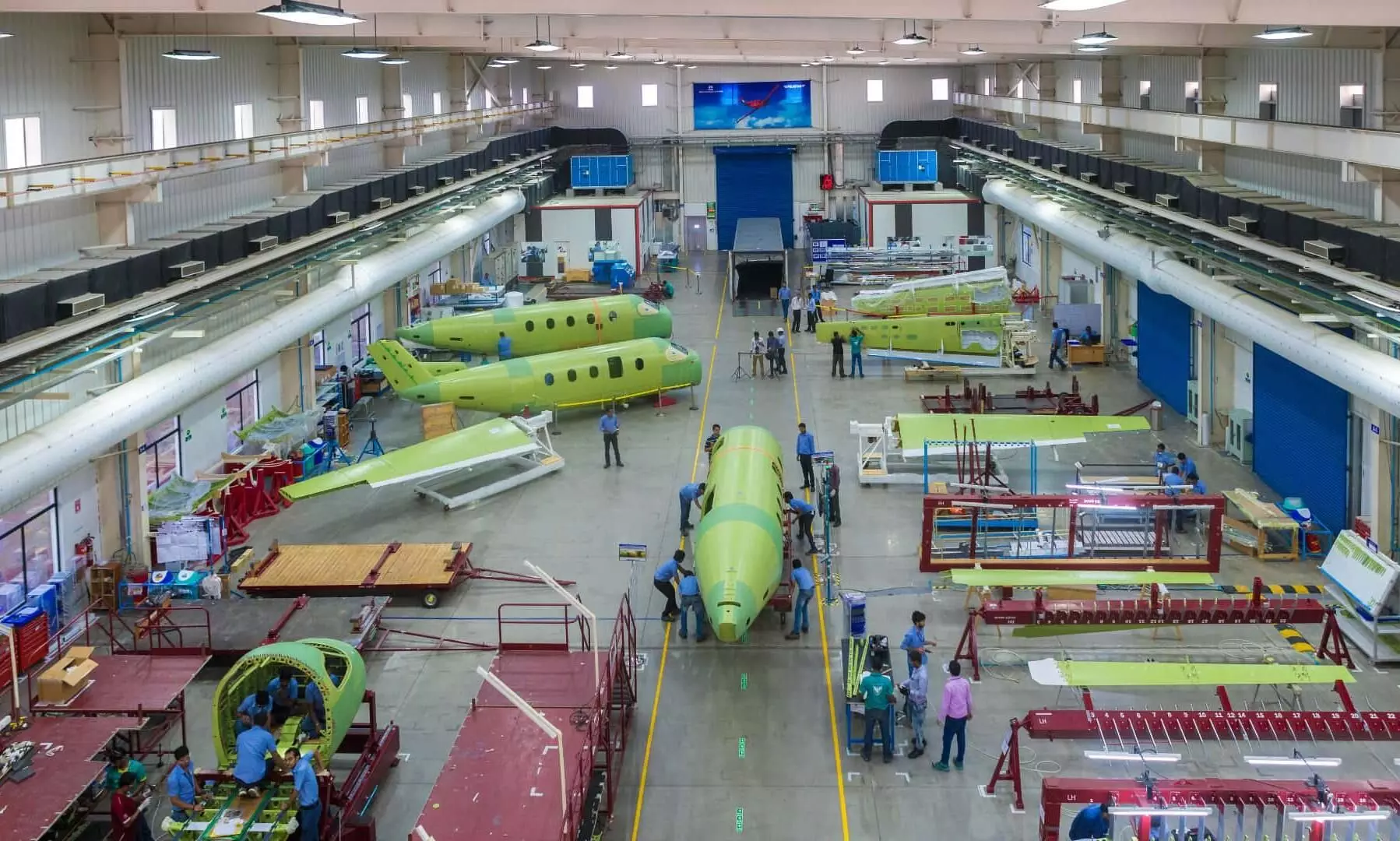
India's rising role in aerospace manufacturing and supply chains

Image credit: Tata Advanced Systems Limited
India is rapidly emerging as a global aerospace powerhouse, luring aviation giants with its skilled talent and cost-efficacy. Major players like Boeing, Airbus, and GE are expanding Indian operations, fostering a thriving ecosystem of domestic suppliers feeding into global supply chains.
Over the past decade, India has rapidly emerged as a major player in the global aerospace industry, attracting leading companies to establish manufacturing facilities and integrated supply chains within its borders. The country's cost-competitiveness, skilled workforce, and favourable government policies have positioned it as an increasingly vital hub for aerospace production.
Historically, the aerospace industry has been dominated by a handful of countries like the U.S., France, and the UK. However, rising labour costs and a growing need for diversification have prompted aerospace giants to look for alternative locations. India, with its large, English-speaking engineering talent pool and significantly lower operating costs, has become an attractive destination.
Major multinational aerospace companies like Boeing, Airbus, and GE have already set up manufacturing plants, engineering centres, and supply chain operations in India. For instance, Boeing's facility in Bengaluru is now a major hub for manufacturing advanced composite floor beams for the company's commercial aircraft programmes. Similarly, Airbus has also fostered strategic partnerships with Indian companies to build a robust supply chain network.
“The Indian market is incomparable to any other market as it has a unique blend of particularly attractive things. India's economy has experienced remarkable growth over the past three decades, contributing to 90% of South Asia's total economic output. The country boasts a skilled workforce, a growing economy, and a burgeoning aerospace ecosystem,” says Salil Gupte, President of Boeing India and South Asia.
“With a presence spanning over eight decades, our investments in India reflect our confidence in the country's potential for growth and innovation. Additionally, the favourable policies and initiatives to promote aerospace manufacturing and technology further reinforce our decision to continue investing in building the ecosystem. Boeing will continue to invest in local manufacturing, co-production, co-development, skill enhancement, and innovation initiatives to support the growth of the larger aerospace, defence, and commercial aviation ecosystem,” added Gupte.
Boeing’s Commercial Market Outlook study found that in the upcoming two decades, South Asia is gearing up to receive more than 2,700 new aeroplanes, with a striking 90 percent set to land in India. It also says India's cargo fleet is expected to reach 80 aeroplanes within 20 years.
“We are experiencing robust growth in the Indian air cargo market, signifying India’s rise as a significant manufacturing and supply chain hub for aerospace firms. The rise in demand for aerospace components and machinery turns to increased freight volumes, underlining the key role DB Schenker plays in facilitating efficient logistics. Positioned strategically, DB Schenker is adept at managing complex supply chains to ensure on-time delivery and efficiency in the evolving Indian aerospace landscape,” says Hitendra Mankani, Chief Commercial Officer, DB Schenker India.
Recognising the aerospace sector's strategic and economic importance, the Indian government has implemented a series of policies and initiatives to attract foreign investment and foster domestic manufacturing capabilities.
In 2020, the government unveiled the Production-Linked Incentive (PLI) scheme for the aerospace and drone industries. This scheme, part of the broader "Make in India" campaign, offers financial incentives to companies that establish manufacturing facilities in India. It aims to create a robust ecosystem for aerospace manufacturing and reduce reliance on imports.
Additionally, the government has eased foreign direct investment (FDI) norms, allowing 100% FDI in the aerospace sector under the automatic route. This move has made it easier for global aerospace companies to invest in India without cumbersome approval processes.
“We are in the process of setting up our first BCF line in India, in partnership with GMR Aero Technic.”
Salil Gupte, Boeing India
The "China+1" strategy has also played a crucial role in driving aerospace companies to establish operations in India. In the wake of supply chain disruptions caused by the Covid-19 pandemic, geopolitical tensions, and concerns over excessive reliance on a single country, many multinational corporations have sought to mitigate risks by diversifying their supply bases. India, with its vast market potential, improving infrastructure, and business-friendly policies, has emerged as a compelling alternative or supplementary destination for aerospace manufacturing and supply chain operations. By adopting a "China+1" approach, companies can maintain their operations in China while simultaneously leveraging India's advantages, reducing vulnerability to potential trade disputes or localised disruptions.
“Boeing is a proud proponent of the “Make in India’ initiative, and this is at the core of our long-term business strategy in India. Our commitment to India's aerospace and defence sector spans 80 years, setting us apart as a reliable partner. We lead among foreign OEMs, with over $1.25 billion in annual manufacturing and services sourced from 300+ Indian supplier partners. Notably, 25% of these partners are Micro, Small, and Medium Enterprises (MSMEs) integral to our global supply chain.
“DB Schenker India is growing its logistical competencies to meet the unique demands of handling aerostructure manufacturing components.”
Hitendra Mankani, DB Schenker India
“India's domestic air cargo trade is forecasted to continue rapid growth at 6.9% per year over the next two decades. In 2023, we partnered with GMR Aero Technic to establish a Boeing Converted Freighter (BCF) line in Hyderabad, while also establishing a Global Support Center in Gurgaon to provide customised operational efficiency and safety improvement projects for airline customers, regulatory bodies, and other stakeholders. Additionally, we invested in a new India Distribution Center to provide efficient and cost-effective service solutions to regional customers, ensuring higher fleet utilisation.”
"Boeing has also teamed up with Cyient, a tech company based in Hyderabad, India, to help with important design-engineering tasks for Boeing planes," Salil added. Cyient currently offers design and stress support for the 747-8 freighter and the 787.
As global aerospace companies deepen their presence in India, a vibrant ecosystem of domestic suppliers and ancillary industries is rapidly taking shape. Indian companies like Bharat Forge, and Dynamatic Technologies are now integral parts of the global aerospace supply chain, manufacturing critical components and assemblies.
For instance “Bharat Forge manufactures a range of titanium-forged parts such as flap-track forgings for the next generation 737 and forgings for the 737 MAX and the 777X,’’ states Salil.
To bolster the Government of India's 'Make in India' initiative, Airbus has granted Bengaluru-based Dynamatic Technologies a contract for manufacturing and assembling doors for its A220 family aircraft.
This marks one of the largest aerospace export contracts to India. The agreement aims to support the ramp-up of the A220 programme by enhancing the existing capacity. Dynamatic will be responsible for manufacturing and assembling cargo, passenger, and service doors, as well as over-wing emergency exit doors for the A220 family aircraft, with eight doors per aircraft included under the contract.
Airbus has also signed contracts with Tata Advanced Systems Limited (TASL) and Mahindra Aerospace Structures Private Limited (MASPL) to buy commercial aircraft components.
Under the agreement, TASL and MASPL will manufacture metallic detail parts, components, and assemblies for Airbus' A320neo, A330neo, and A350 programmes. These two companies are already among over 100 Indian suppliers that provide components and engineering and digital services for various Airbus programmes.
“Airbus has made ‘Make in India’ front and centre of its strategy in the country. Our ambition is not only to support the growth of the Indian commercial fleet but also to grow the complete aerospace ecosystem here – and that includes developing and strengthening manufacturing and engineering capabilities from our Indian partners,” says Rémi Maillard, President, and Managing Director of Airbus India and South Asia. “Tata Advanced Systems and Mahindra Aerostructures already contribute to our aircraft programmes, and the latest contracts increase our cooperation with them.”
In addition, TASL also manufactures complex floor beams for the Boeing 787-8, 9, and 10 Dreamliners while MASPL has been awarded a contract for manufacturing and supply of the Boeing 737 inlet outer barrel components and sub-assemblies, at the MASPL facility in Narsapura, near Bengaluru.
With a large network of warehouses and logistics expertise, DB Schenker has a well-established presence in India, This provides them with the infrastructure and capabilities to handle the complex logistics needs of the aerospace industry, which often involves oversized, high-value components.
“To meet the evolving demands of India’s aerospace manufacturing sector, we implement specialised protocols and practices for handling sensitive aerospace parts and deliver products and components on time. With our Total Care Solutions, we offer transport and logistics to the aerospace aftermarket. This includes regular spare parts delivery, emergency transports (AOG), warehousing for critical spare parts, distribution centre, and repair logistics solutions. Additionally, we use advanced tracking systems and real-time monitoring to provide seamless coordination and faster on-time delivery, supporting the stringent production schedules of aerospace manufacturers. This customised approach underlines DB Schenker’s commitment to providing bespoke solutions tailored to the unique needs of the aerospace industry,” says Hitendra.
Major global aerospace Original Equipment Manufacturers (OEMs) like GE Aviation and Rolls-Royce have established significant operations in India, underscoring the country's growing importance. GE Aerospace has recently announced its plans to invest over Rs 240 crore (around USD 30 million) to upgrade its manufacturing facility in Pune. The Pune facility of GE produces components for commercial jet engines. These are supplied to GE Aerospace’s global factories where they are used to assemble G90, GEnx, GE 9X, which is the world’s most powerful commercial jet engine, and the LEAP engines by CFM, a GE and Safran joint venture.
“Our team at our Multi-modal Manufacturing facility in Pune has a strong focus on safety, quality, and delivering for our customers. I am delighted to see the expansion at this site which has already become a strong contributor to our global supply chain of aircraft engine components,” says Mike Kauffman, vice president, Global Supply Chain at GE Aerospace.
Similarly, Rolls-Royce operates a flagship engineering centre in Bengaluru with over 1,000 engineers working on design, analysis, testing, and product data management for products like the Trent aero engine across civil aerospace, defence, marine, and energy verticals. Rolls-Royce also has a supply chain operating unit in India that procures components from over 40 domestic suppliers and manufacturers, including partners like Tata Advanced Materials, Hindustan Aeronautics Limited (HAL), and TCS for engineering services.
To support the burgeoning aerospace industry, India has invested heavily in developing specialised infrastructure and upskilling its workforce. Several aerospace-focused industrial parks, special economic zones, and dedicated skill development centres have been established across the country.
The Government of India has also partnered with leading aerospace companies to establish training programs and centres of excellence, ensuring a steady supply of skilled engineers, technicians, and workers to meet the industry's growing demands.
Airbus has entered into a contract with the Indian Institute of Management in Mumbai (IIM Mumbai) to offer aviation education to professionals. The partnership aims to equip individuals with industry-ready skills through Airbus Beyond programmes.
Similarly, Boeing has partnered with Air India Engineering Services Ltd and the Ministry of Civil Aviation to provide an Accelerated Apprenticeship Programme for aircraft maintenance engineers (AME). The aim is to enhance the employability of AMEs through training and hands-on experience with actual aircraft.
While India has made significant strides in attracting aerospace manufacturing, challenges remain. Improving infrastructure, streamlining regulatory processes, and enhancing research and development capabilities are areas that require continued focus.
However, the long-term prospects for India's aerospace sector are promising. With a growing domestic aviation market, a commitment to self-reliance in the manufacturing sector, and a concerted effort to develop a robust supply chain ecosystem, India is poised to become an indispensable partner for global aerospace companies.

